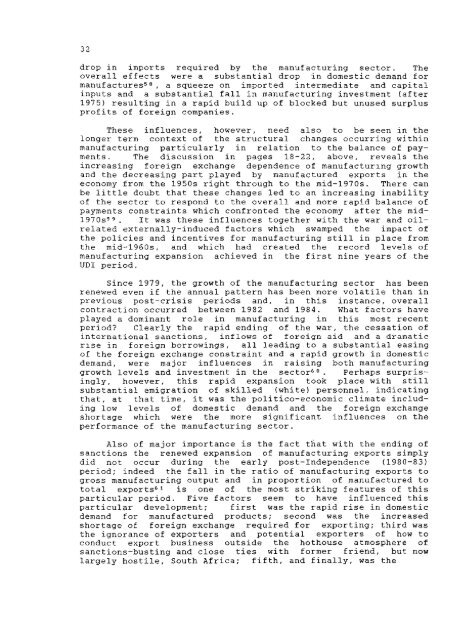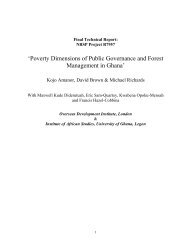Zimbabwe - Overseas Development Institute
Zimbabwe - Overseas Development Institute
Zimbabwe - Overseas Development Institute
Create successful ePaper yourself
Turn your PDF publications into a flip-book with our unique Google optimized e-Paper software.
drop i n imports required by the manufacturing sector. The<br />
o v e r a l l e f f e c t s were a s u b s t a n t i a l drop i n domestic demand for<br />
manufactures'8 , a squeeze on imported intermediate and c a p i t a l<br />
inputs and a s u b s t a n t i a l f a l l i n manufacturing investment ( a f t e r<br />
1975) r e s u l t i n g i n a r a p i d b u i l d up of blocked but unused surplus<br />
p r o f i t s of f o r e i g n companies.<br />
These i n f l u e n c e s , however, need also to be seen i n the<br />
longer term context of the s t r u c t u r a l changes o c c u r r i n g w i t h i n<br />
manufacturing p a r t i c u l a r l y i n r e l a t i o n to the balance of payments.<br />
The d i s c u s s i o n i n pages 18-22, above, reveals the<br />
i n c r e a s i n g f o r e i g n exchange dependence of manufacturing growth<br />
and the decreasing part played by manufactured exports i n the<br />
economy from the 1950s r i g h t through to the mid-1970s. There can<br />
be l i t t l e doubt that these changes l e d to an i n c r e a s i n g i n a b i l i t y<br />
of the sector to respond to the o v e r a l l and more r a p i d balance of<br />
payments c o n s t r a i n t s which confronted the economy a f t e r the mid-<br />
1970s''. I t was these i n f l u e n c e s together with the war and o i l -<br />
r e l a t e d e x t e r n a l l y - i n d u c e d f a c t o r s which swamped the impact of<br />
the p o l i c i e s and i n c e n t i v e s f o r manufacturing s t i l l i n place from<br />
the mid-1960s, and which had created the record l e v e l s of<br />
manufacturing expansion achieved i n the f i r s t nine years of the<br />
UDI period.<br />
Since 1979, the growth of the manufacturing sector has been<br />
renewed even i f the annual pattern has been more v o l a t i l e than i n<br />
previous p o s t - c r i s i s periods and, i n t h i s instance, o v e r a l l<br />
c o n t r a c t i o n occurred between 1982 and 1984. What f a c t o r s have<br />
played a dominant r o l e i n manufacturing i n t h i s most recent<br />
period? C l e a r l y the r a p i d ending of the war, the cessation of<br />
i n t e r n a t i o n a l sanctions, inflows of f o r e i g n a i d and a dramatic<br />
r i s e i n f o r e i g n borrowings, a l l leading to a s u b s t a n t i a l easing<br />
of the f o r e i g n exchange c o n s t r a i n t and a r a p i d growth i n domestic<br />
demand, were major i n f l u e n c e s i n r a i s i n g both manufacturing<br />
growth l e v e l s and investment i n the sector^". Perhaps s u r p r i s <br />
i n g l y , however, t h i s r a p i d expansion took place with s t i l l<br />
s u b s t a n t i a l emigration of s k i l l e d (white) personnel, i n d i c a t i n g<br />
that, at that time, i t was the politico-economic climate i n c l u d <br />
ing low l e v e l s of domestic demand and the f o r e i g n exchange<br />
shortage which were the more s i g n i f i c a n t i n f l u e n c e s on the<br />
performance of the manufacturing sector.<br />
Also of major importance i s the f a c t that with the ending of<br />
sanctions the renewed expansion of manufacturing exports simply<br />
did not occur during the e a r l y post-Independence (1980-83)<br />
period; indeed the f a l l i n the r a t i o of manufacturing exports to<br />
gross manufacturing output and i n proportion of manufactured to<br />
t o t a l exports^' i s one of the most s t r i k i n g features of t h i s<br />
p a r t i c u l a r period. Five f a c t o r s seem to have influenced t h i s<br />
p a r t i c u l a r development; f i r s t was the r a p i d r i s e i n domestic<br />
demand for manufactured products; second was the increased<br />
shortage of f o r e i g n exchange required f o r exporting; t h i r d was<br />
the ignorance of exporters and p o t e n t i a l exporters of how to<br />
conduct export business outside the hothouse atmosphere of<br />
sanctions-busting and close t i e s with former f r i e n d , but now<br />
l a r g e l y h o s t i l e . South A f r i c a ; f i f t h , and f i n a l l y , was the
















